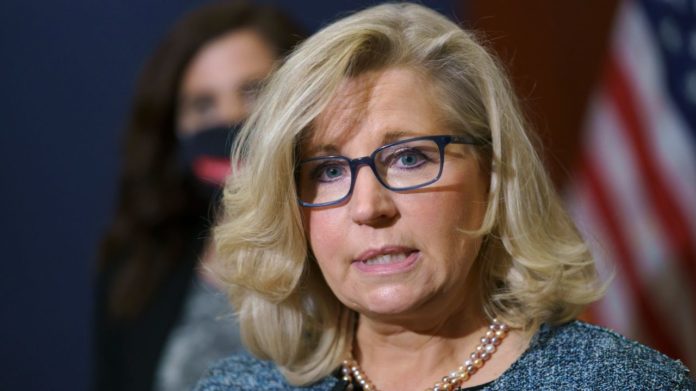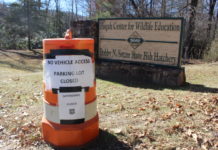Anyone with a passing familiarity with Republican politics or gangland dramas knew that Rep. Liz Cheney had it coming. After the Wyoming Republican voted in January to impeach President Donald Trump, it was only a matter of time.
But while the national party is just getting around to defenestrating Cheney, who is expected to lose her No. 3 position in the House leadership next week, the state party long ago denounced her. To see how poisonous national Republican politics can get — and yes, they can get more poisonous — look to Wyoming, where I visited in March.
In a lopsided vote held three months ago, the Wyoming Republican Party censured Cheney; so have more than half the state’s GOP county committees. The denunciations are having an effect: A poll taken last month shows 52% of Republican primary voters say they will vote against her no matter who she faces in 2022.
Cheney was targeted for one reason: her vote to impeach Trump, which flowed directly from her refusal to contest the truth about the 2020 election. The trouble started with her statement just after the Jan. 6 attack on the Capitol that Trump had “summoned this mob, assembled the mob, and lit the flame of this attack.” Her defiance continued into last week, when she published a column in The Washington Post in which she wrote that the party now faces a choice between lies and “fidelity to the Constitution.”
“In many ways, what Liz Cheney is doing is bigger than Wyoming,” said former Wyoming Republican Party chairman Matt Micheli, now a lawyer in Cheyenne. “This is about truth,” he told me. “This is about asking GOP voters to accept facts over fantasy.”
Before censuring Cheney, the Wyoming Republican Party censured Joe McGinley. Or so many people believe.
“I didn’t go to the meeting, so I don’t quite know what their argument was,” said McGinley, the chairman of the Natrona County Republican Party. “One thing was speaking to the media,” he told me, pointing out that his county committee meetings are open to the press and public. “The state party apparently didn’t like that.”
According to a report in the Casper Star Tribune, the state party required members to sign a nondisclosure agreement to participate in the censure action, which took place in January. It then censured McGinley without making the matter public or even informing the target of the rebuke, raising many questions, including what the party’s definition of “censure” might be. The newspaper was unable to pry additional details loose.
In September, the party had censured another member of the Natrona Republican state committee, JoAnn True. True was rebuked for supporting the bipartisan Cowgirl Run Fund, which promotes women for public office — even if they run as Democrats.
As the dominant party in what is effectively a one-party state — where Trump won 70% of the vote, more than in any other state — Wyoming Republicans don’t need to make compromises with Democrats. But the state party seems equally uninterested in compromise among Republicans.
“The few Republicans in 2021 clinging to the notion that there is still a ‘Big Tent’ are living in the past,” writes Marti Halverson, a former Wyoming state representative whose Cowboy State Daily columns echo the party gestalt. “Republicans no longer need to, or should, dilute our principles to gain members and votes.”
In recent years, the state party has become a bastion of what McGinley and some other Republicans call extremism. The description encompasses party members’ tactics as much as their positions, which tend to be whatever is the most conservative or libertarian version of a given policy stand (such as a vow to nullify federal regulation of guns).
Republican reactionaries ousted more pragmatic conservatives and gained control of many county parties along with the state GOP apparatus. “My sense is they’re a bunch of people who really have nothing else to do,” said Alexander Muromcew, the chairman of the Teton County Republican Party who, like McGinley, has cast his lot with the pragmatists. “So they were able to devote much more time and energy to this than most of us who, you know, do this as a part-time, volunteer activity.”
Having gained control of the state party, the small-tent Republicans are advancing on the legislature as well, where several targeted Republicans have already fallen, and there is talk that they are looking for a far-right candidate to defeat Gov. Mark Gordon, R, in a 2022 primary. Control of state government lies in the balance.
Taylor Allred, an unsuccessful state House candidate and well-known activist, captured the mood fueling efforts to overthrow the GOP establishment, wherever it lurks. “Our country is under attack,” he wrote on Facebook in January. “Our state is under attack. Our political representatives (I almost said leaders), both at the Federal and State level have betrayed us. They need to be held accountable and replaced.”
The goal is to transform Wyoming into a mountain MAGA kingdom, with or without the exiled king’s return from Mar-a-Lago. In the meantime, relations within the party are toxic.
“I’ve been pondering this,” said Gail Symons, a former naval officer and corporate manager from Sheridan who’s active in the GOP’s pragmatist wing. “What I keep seeing is anger and fear.”
Some of the rage has seeped into Symons’ hometown of Sheridan, which is hardly the land of the left-behind. Housing prices in the county increased 5.5% in the past year, according to Zillow. Nestled beneath the magnificent Bighorns, Sheridan’s downtown is alive and kicking: cafes, yoga studio, fly-fishing shop, Starbucks, Morgan Stanley.
No matter. The Sheridan County GOP was among those that voted to censure Cheney. Judging from its website, the county committee may be a bit prickly about its reputation. “Click on the link below to see what sort of ‘extremists’ we are,” the homepage announces. If you click, you end up at the state party platform.
The first Wyoming county to censure Cheney was Carbon County, which borders Colorado. Its chairman is Joey Correnti IV, who calls himself “an extremely focused, liberty minded constitutional conservative” on his Facebook page, which also features a photo of him with a holstered replica of a 19th-century single-action Colt army revolver on each hip. “I believe my county’s version served as a base for many other counties to create their own,” he told me in an email. “Most chose to stick fairly close to the original language.”
The state resolution hews closely to Carbon’s copy. It enshrines the lies that Cheney has defied, resting the case for her censure in part on “significant irregularities in the election process in several states,” a claim that was repeatedly disemboweled by federal and state courts and numerous state election officers, Republicans as well as Democrats, long before the Wyoming resolution was adopted.
It further states: “Ample video evidence suggests the riot at the capital [sic] was instigated by Antifa and BLM radicals.” No such evidence ever existed, of course, or ever will.
Yet the management of such falsehoods is now the core business of much of the Republican Party. It is the rationale, stated or implied, for hundreds of state legislative bills around the country designed to make voting harder and American democracy less representative. Commitment to the lies is both the foundation of policy and a test of party loyalty.
“History is watching,” Cheney wrote in her essay last week. “Our children are watching. We must be brave enough to defend the basic principles that underpin and protect our freedom and our democratic process. I am committed to doing that, no matter what the short-term political consequences might be.”
For Cheney, those consequences are likely to be severe. They may be for the rest of America as well.
Francis Wilkinson writes about U.S. politics and domestic policy for Bloomberg Opinion. He was previously executive editor of the Week, a writer for Rolling Stone, a communications consultant and a political media strategist.
Credit: Source link































